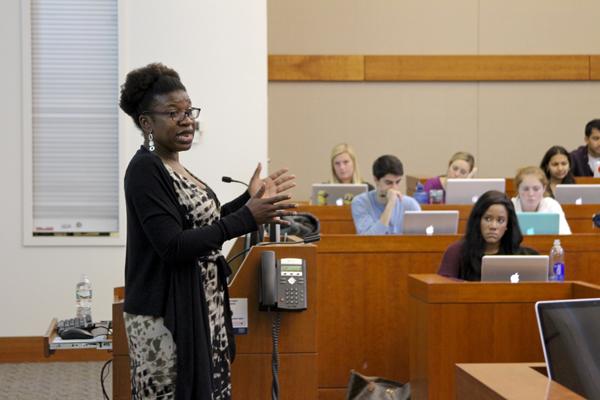As students search for spring semester classes over the next few weeks, they will pore over professors’ helpfulness and clarity scores on websites like RateMyProfessors.com.
At GW, those internet comments are all most students have to use to gauge professors’ effectiveness. But according to documents obtained by The Hatchet, the former GW School of Business dean called the lack of published professor ratings “a contributor to poor teaching” at the college.
“Elite business schools publish those rankings, and their professors must take responsibility for what and how their students learn,” Doug Guthrie wrote in a 2010 business strategy for the school.
Policies on the openness of professor ratings vary across universities and GW’s colleges. Now, department chairs in all of GW’s 10 colleges can see students’ evaluations of professors, but few departments let students see aggregated reviews or scores.
Students in most schools fill out evaluations that both describe and numerically rate professors. Department chairs use evaluations to assign classes to professors, and elect professors for promotions and pay raises. When applying for tenure, faculty must compile records of their research, service and teaching.
Forrest Maltzman, vice provost for academic affairs and planning, said “there is a feeling that we need to make sure that we have more assessment of faculty in their teaching,” but that ratings that are open for students’ view may not be the right move.
“What I would love for ratings to do is to help students understand what types of experiences they are going to have in the classroom. And aggregate ratings actually frequently disguise that, so that is the one concern I do have,” Maltzman said.
Guthrie, who was fired in August for the fallout over overspending his budget by $13 million, said he suspected the business school had “lost market share in areas where it was once strong” because of poor teaching quality. He added that the secrecy around teacher ratings keeps important information away from students.
The decision of whether to make evaluations public – and how deeply they are reviewed – lies with GW’s department chairs, many of whom disagree on whether or not they should be shared with students.
Finance department chair Robert Van Order said the evaluations help chairs decide which professors will teach certain classes because they can help show faculty’s strengths and weaknesses.
While he thought students could have access to the summarized numbers with which students rate a professor, he thought the written comments should remain for the professor, chair and dean.
But marketing chair Vanessa Perry, an associate professor, said students should be able to see evaluations as a whole.
“If the ratings are reliable,” Perry said, “students can use that information to learn something about the professor’s style.”
Added assessment would tie into some of GW’s recent academic reforms. The Columbian College of Arts and Sciences overhauled its academic requirements three years ago to increase rigor. The University started a group called the Teaching and Learning Collaborative to improve teacher training.
At the University of Minnesota, student leaders have lobbied for professor evaluations to be available to students for nearly a decade. The Columbia University Senate approved a resolution last year to publish the evaluations should professors permit the University to do so.
Other programs have their own evaluation systems and departments use the feedback differently. The computer science department has made evaluations available online since 2003.
“We created it in the spirit and culture of openness and providing information so we did not have to look very far to say, ‘Let’s make that available to all of us,’” department chair Abdou Youssef said.
The law school similarly publishes its professor ratings, both qualitatively and quantitatively, each year.
Paul Waters, a law student who serves on the Student Association academic affairs committee, said the evaluations were “incredibly accessible.”
“I think it is interesting to see what other people say, because you get a good idea on the class as a whole,” he said.
Waters, who studied at GW as an undergraduate, said he thinks it’s an area where undergraduate schools and other graduate programs can improve. He said the academic affairs committee of the SA has discussed the topic and may act on it this year.
James Bailey, a professor of management who has conducted research on change in higher education, said all universities, including GW, need to put a greater emphasis on teaching by doing things like making teaching centers more visible.
But he said he feared those poor evaluations could lead to students avoiding classes that are essential in particular fields.
He said although students are the “consumers,” business professors often teach topics which students do not fully appreciate until they are in a certain job, which can lead to poor evaluations.








